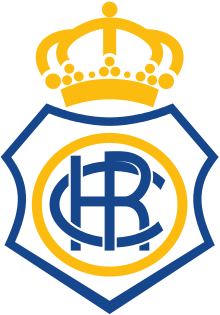Real Club Recreativo de Huelva, S.A.D. (Spanish pronunciation: [reˈal ˈkluβ rekɾeaˈtiβo ðe ˈwelβa]) is a Spanish football club based in Huelva, in the autonomous community of Andalusia. Founded on 23 December 1889, they are the oldest football club in Spain, and currently play in Segunda División B – Group 4, holding home games at Estadio Nuevo Colombino, which has a 21,600 capacity.
Team colours are white shirts with blue vertical stripes and white shorts.
History
Foundation/Early years
It all began courtesy of two Scots, Alexander Mackay and Robert Russell Ross, overseas workers at the Rio Tinto mines, and the club was originally named Huelva Recreation Club. The doctors founded a recreation club in order to provide the mine workers under their care with physical recreation. Then they were invited by Sevilla F.C. to play their first football match.
During the 1910s, the club won 3 non-official Andalusian regional cups, and became the first Spanish side to defeat a Portuguese team, winning against Sporting Clube de Portugal. In 1940, it first reached Segunda División, only lasting however one year and not returning until 1957. Since 1965, the team also began hosting the Trofeo Colombino.
Later years
In 1977–78, led by, amongst others, former Real Madrid youth graduate Hipólito Rincón, Recreativo first gained promotion to the top flight. After just one season, it returned to level two, staying there until 1990, the year of a Segunda División B relegation.
Recre would play again in the first division in 2002–03, in another short-lived experience. However, it achieved one of the most significant honours in the club's history by reaching the final of the domestic cup for the first time, being defeated by RCD Mallorca 0–3. In 2005–06, after beating CD Numancia on 4 June 2006, it mathematically secured promotion with two matches left to be played.
The new season in the top level was one of overachievements. The club finished eighth in the table, at 54 points, a best-ever. Among the victories was a 3–0 win against Real Madrid at the Santiago Bernabéu Stadium and a 2–0 success against Valencia CF. The club's leading goalscorer was Florent Sinama Pongolle with 12 goals to his name. Coach Marcelino García Toral announced on 30 May 2007 that he would leave the club at the end of the season, subsequently joining Racing de Santander – he had also been the coach that previously achieved the 2006 promotion.
"Everything in life has a beginning and an end, and this is the moment to end my time at Recre," Marcelino told a news conference.
This fueled speculation in June 2007 that Recreativo had offered Danish legend Michael Laudrup a contract to coach the club in 2007–08. According to Laudrup's agent, the negotiations were ongoing and "very serious." However, Laudrup turned down the offer, and took the vacant manager's job at Getafe CF in July 2007. Recre' season was a rocky one, as they only achieved to maintain first division status in the very last matchday, drawing with Real Valladolid 1–1. Also, Mallorca's 3–2 success against Real Zaragoza, contributed to Huelva's final 16th position.
In 2008–09, Recreativo de Huelva lived in the mid-table regions for the vast majority of the campaign. However, after just one win in its last 15 matches (this included losing the last four) and one draw, it was finally relegated back, ranking last.
Season to season
|
|
| Season |
Division |
Place |
Copa del Rey |
|
1940/41 |
3ª |
2nd |
|
| 1941/42 |
Regional |
— |
|
| 1942/43 |
Regional |
— |
|
| 1943/44 |
3ª |
6th |
|
| 1944/45 |
3ª |
6th |
|
|
Current squad
- As of 6 September 2016.
Note: Flags indicate national team as defined under FIFA eligibility rules. Players may hold more than one non-FIFA nationality.
Youth players
Honours
Notable coaches
International players
References
External links
|
|---|
|
- History
- Players
- Managers
- Seasons
- Europe
- Statistics
- Honours
|
|
| Teams | |
|---|
|
| Home stadium | |
|---|
|
| Related articles | |
|---|
|
| Seasons |
- 2000–01
- 2001–02
- 2002–03
- 2003–04
- 2004–05
- 2005–06
- 2006–07
- 2007–08
- 2008–09
- 2009–10
- 2010–11
- 2011–12
- 2012–13
- 2013–14
- 2014–15
- 2015–16
- 2016–17
|
|---|
